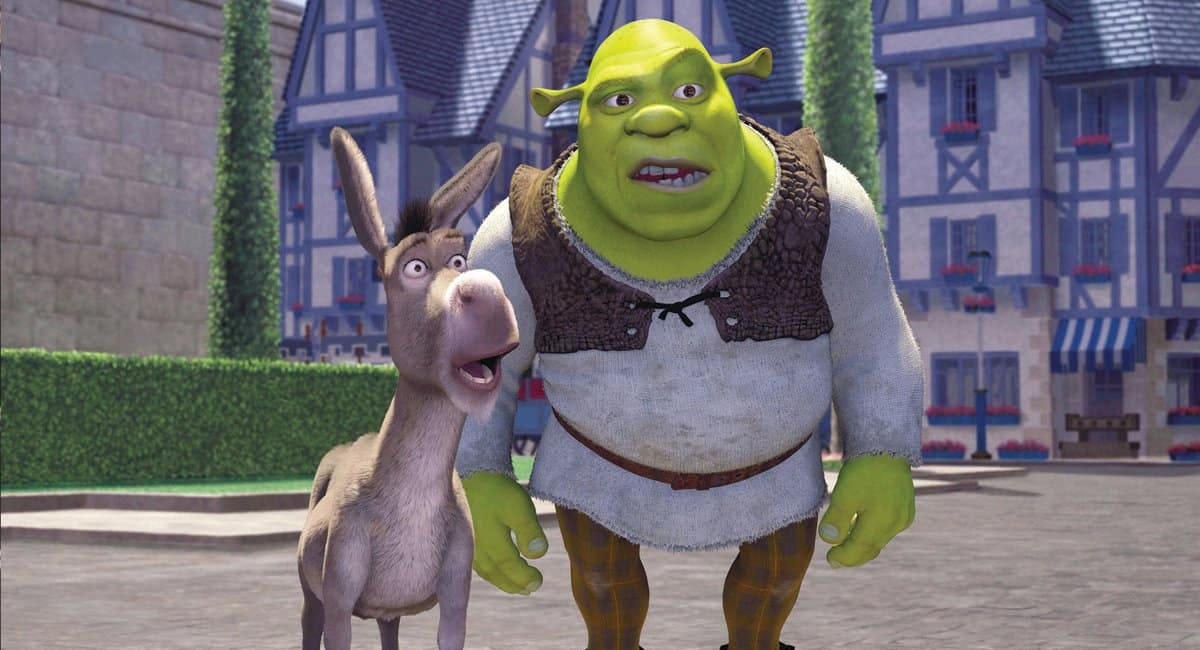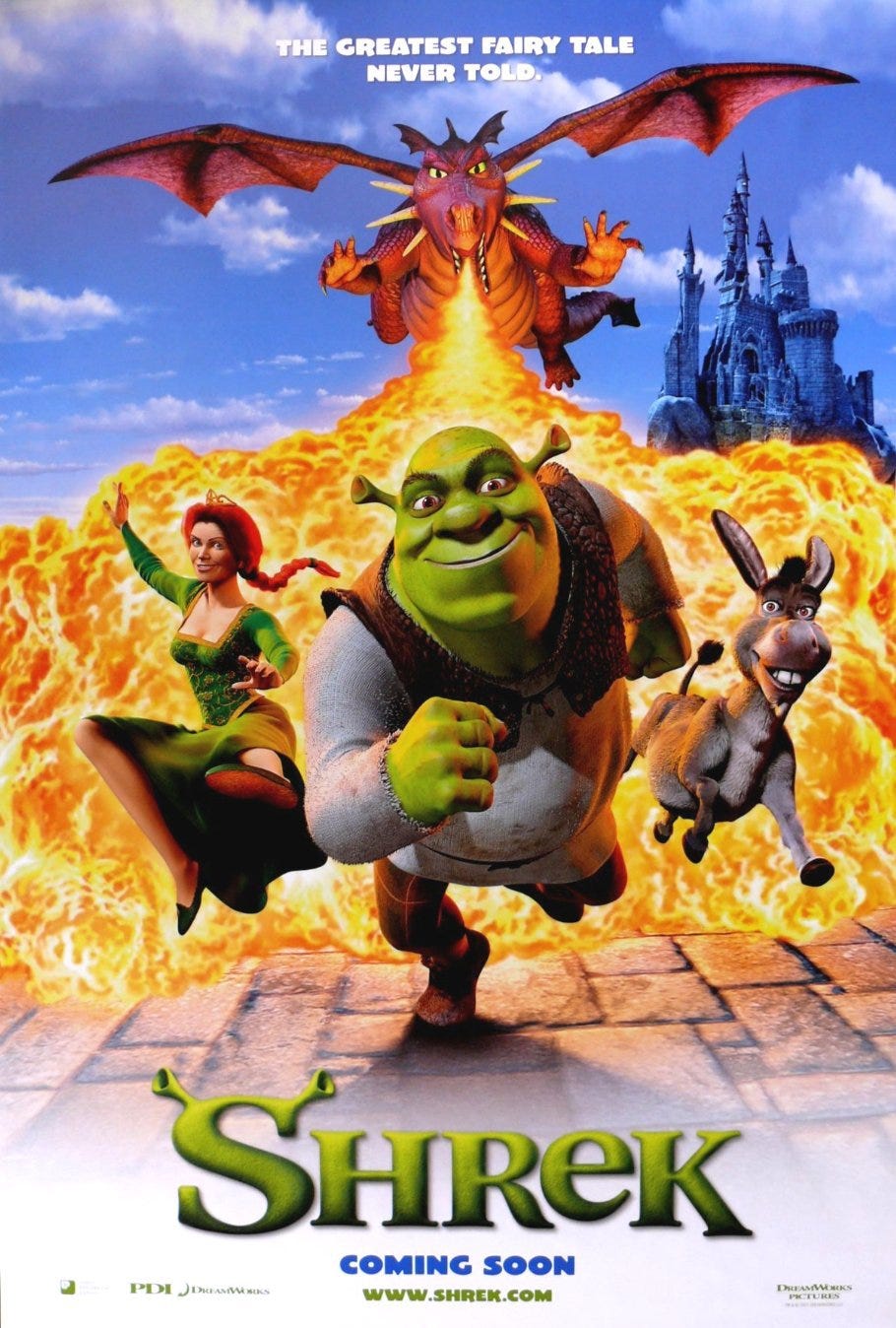There’s a Hilarious Flaw to the Most Prominent Theme in Shrek (2001)
Today’s issue of Dust On The VCR is another subscriber request! This film was chosen by my dear friend Adam Crigger, whom I miss very much. (He’s not dead, he just moved to Virginia.) Adam is a man of good taste when it comes to music (particularly hip-hop), and as you know, good taste often translates to other artistic mediums. So when I told him I’d never seen Shrek and he looked at me like I said I hate puppies or I don’t vote, I took him seriously. That is how I came to watch Shrek for the first time in my life. And now here we are. Anyway. Want to request a film for a future issue? Subscribe to the paid version!
The internet is a super weird place sometimes, but I don’t think the memeification of Shrek is ironic or accidental.
Despite the fact that this movie looks absolutely terrible, there’s a lot to appreciate about it.1 It takes a bevy of fairy tale tropes and playfully subverts them, giving its target audience something familiar and something fresh at the same time. And the voice actors all seem to be having a lot of fun with their characters.
But Shrek is more than just jokes and references.2 Being that it’s a film for children (or maybe early teenagers), there’s a message for younger viewers that, assuming they paid attention, they can take with them to interact more kindly with the world around them.
And it’s a nice message too. Our titular protagonist is an ogre, after all, and as he tells his talking donkey friend, “There’s a lot more to ogres than people think.”
Therein lies the positive takeaway. Shrek has become so used to people calling him ugly and stinky and scary that he doesn’t even understand why Donkey and Princess Fiona want to be his friend. (These characters are a proxy for the viewer, of course, who has almost certainly been conditioned to think of ogres as big and bad and mean.) As other characters begin to treat Shrek with respect, his self-esteem rises, and he grows to believe in himself—so much so that he’s willing to interrupt a royal wedding in an attempt to sway the beautiful bride.3
A message of acceptance and tolerance! We love to see it. There’s just one little (hilarious) catch.
You see, there is an actual villain in this story. His name is Lord Farquaad (voiced by John Lithgow, one of our finest cinematic baddies), and seeing as he’s the villain, he possesses many poor qualities. He’s so malicious that he exiles all the storybook characters (“fairy tale trash poisoning my perfect world,” as he tells us) in what could be described as a light genocide. He’s so greedy that he seeks out a princess to marry just so he can become a king. And he’s so selfish that he’s willing to let any number of knights risk their lives slaying a dragon to bring him said princess.4
But he’s never really called out for any of these inner flaws, egregious as they are. He’s only taken to task for one outwardly flaw: He’s short.
The first time Shrek and Donkey behold Lord Farquaad’s castle, Shrek immediately dunks on him for “overcompensating for something.”5 From there, it’s a parade of jokes at the expense of this man’s stature. Even Princess Fiona immediately makes a short joke when she meets him (that thankfully goes right over his head).6
And the film is in on the joke too! This character isn’t just modeled to be comically short—he’s frequently positioned next to people or things that accentuate his lack of height. None of it is an accident. It’s meant to illustrate how oblivious and undesirable he is, and the viewers (who are, again, mostly children) are meant to giggle at how untall this man is.
I don’t think we should cancel Shrek or anything. But I’m amused at such a discrepancy. I mean, either the writers didn’t understand that their illustration and treatment of Farquaad was directly antithetical to the film’s central message, or they want viewers to believe it’s well and good to make fun of someone’s surface flaws as long as they’re rotten on the inside.7
And maybe it is. I don’t know. Wait…is this where the term “short king” comes from? (Oh no, have I been Shrek-pilled?)
Shrek is now streaming on Peacock and DirecTV, and it is available to rent elsewhere.
I honestly thought I was watching the wrong thing at first. I know CGI has come a long way in the last two decades, but Shrek was released the same year as Monsters, Inc., and that film looks great! Come on, DreamWorks!
My favorite reference is when the Seven Dwarves present Snow White to Shrek and he calls her a “dead broad.” What a time this was.
I won’t spoil the ending in case you’re a weirdo like me who’s never seen Shrek, but you will probably see it coming from a mile away. Especially since you’ve likely been inundated with Shrek propaganda for the last 20 years.
My editor, John, a noted expert on all things Disney, tells me that Jeffrey Katzenberg, longtime chairman of Disney and co-founder of DreamWorks, may have based the Lord Farquaad character on Michael Eisner, his former boss at Disney. Apparently Katzenberg does not like this man.
I’d love to ask the writers of Shrek if they intended this to be a dick joke. One could pass it off as a short joke because it’s a children’s movie, but reader, this would not be the only dick joke in the movie.
Because he’s narcissistic and aloof, I mean. Not because he’s, you know…short.
There are three sequels to Shrek that I have not seen and probably will never see. Perhaps this mockery is addressed in the sequels? You tell me, reader.




Thank you for not spoiling the ending. I still think I might watch it someday.